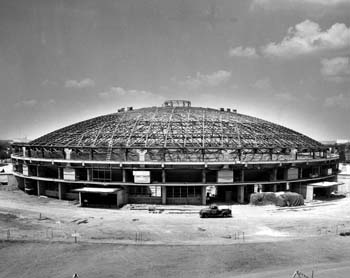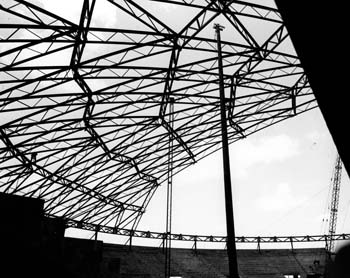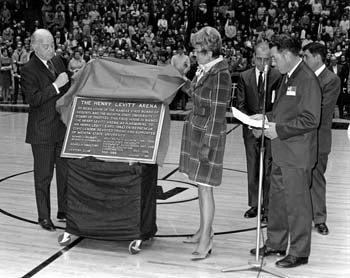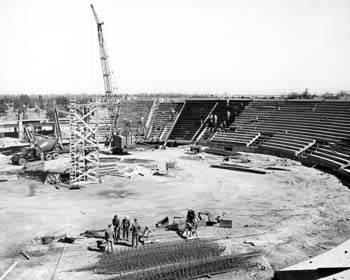 In the spring issue of The Shocker, we asked you, our readers, to share your favorite memories of Henry Levitt Arena, which is undergoing a massive $25 million renovation and slated to reopen in late summer or early fall 2003 as the Koch Arena. Following is a sampling of your responses. Thanks for the memories.
In the spring issue of The Shocker, we asked you, our readers, to share your favorite memories of Henry Levitt Arena, which is undergoing a massive $25 million renovation and slated to reopen in late summer or early fall 2003 as the Koch Arena. Following is a sampling of your responses. Thanks for the memories.
Stout Hearts
Wilson K. Cadman ’51
Kate Smith had a huge voice and an even bigger fan following. Her semi-operatic sound thrilled literally millions over her network radio show. And her classic rendition of God Bless America served as the beacon for our nation during the dark days of World War II.
Ms. Smith’s impromptu performance at Levitt Arena the night of Nov. 28, 1970 is my most memorable memory of the Roundhouse. She was one of the many performers in Wichita to appear in The Night of Stars, the telethon that followed the tragic October 1970 football plane crash. By the time the benefit telecast could be arranged, a second tragedy occurred: Marshall University’s team plane had gone down, and that school was to share in the telethon’s proceeds.
For Wichita and WSU, the telethon was more than a fund-raising event. It would focus the entire nation on not only the loss of life, but on the university and city. The list of performers who took part reads like a Who’s Who of Show Business at the time, including emcee Monty Hall, Bill Cosby, Lou Rawls, Mac Davis, Leif Erickson, Phil Ford and Mimi Hines, Humble Pie, Marilyn Maye, Minnie Pearl, the Young Americans and George Gobel, as well as Ms. Smith. Ohio State football coach Woody Hayes also appeared.
I was at the Shocker-Louisville football game the afternoon of the day the show was to air when a call for me came over the Cessna Stadium public address system. It asked — actually, it ordered — me to go to the box of then-president Clark Ahlberg. En route, I met a frantic Dean Jabara, who had been sent to find me. “Wilson,” he said, “we’ve just learned there is not enough electrical capacity in the university’s system and in Levitt Arena for tonight’s show. There may be no telethon.”
 |
| On Jan. 17, 1969 the Roundhouse was dedicated in honor of the late Henry Levitt, a civic leader in Wichita and a noted WSU supporter. The arena’s first basketball game was played Dec. 3, 1955, when the Shockers lost to Utah, 51-73. Its formal dedication was four days later when the Shockers lost a heartbreaker to the KU Jayhawks, 55-56. |
That was three hours before the telethon was to go on the air. Unfortunately, solving the problem was more than stringing an extension cord. The closest place that more capacity was available was in a KG&E's electric line at the corner of 21st Street and Hillside. This meant a line had to be built and new transformers installed just to get power to the arena. Inside, even more work had to be done.
I was young enough to think even the impossible could be done immediately. In fact, there was no choice but to try. Without the telethon the two stricken football programs not only would be without money, but the whole nation would see a dimly lit and embarrassing effort on the part of the community.
Fortunately, I had seen Bob Matson, who headed KG&E's Wichita line operations, at the ball game. Immediately I got in touch with him. I also knew the best-equipped electrical contractor to do the work inside the arena was Scott & Landers, and I called Bill Landers. Both Bob and Bill immediately began engineering in their heads a plan to upgrade the electric service — and do it in less than 2 1/2 hours.
Bob began calling KG&E's line crews, dictating the equipment and materials they would need. I still remember the feeling of pride as a caravan of some 30 red kg&e trucks began pulling into the Levitt Arena parking lots from every direction. Using truck-mounted diggers, they began boring holes for poles through the pavement. Other men started stringing wire, and still others were unloading and setting transformers.
Scott & Landers employees were equally busy. To get heavy electrical switch gear, they tore down concrete block walls, pulled it from a building under construction and hauled it to the arena. Then they laid cables throughout the gym and around the concourse to get power to abc’s equipment. Sheriff’s officers guarded the cables so people in the packed field house would not step on them and be injured.
 |
| On Jan. 17, 1969 the Roundhouse was dedicated in honor of the late Henry Levitt, a civic leader in Wichita and a noted WSU supporter. The arena’s first basketball game was played Dec. 3, 1955, when the Shockers lost to Utah, 51-73. Its formal dedication was four days later when the Shockers lost a heartbreaker to the KU Jayhawks, 55-56. |
Ms. Smith did not sing her unequaled version of God Bless America. Resplendent in a floor-length sequined red gown, she stood where she could see the men at work — and they her — and in one of the world’s most fantastic and biggest voices sang Stout-Hearted Men to them. They responded by working even faster.
Like a classic movie story line, the race against the network deadline went on. With minutes to spare, the lines were energized and the power flowed. The show was saved. More than $320,000 was raised for the two schools in pledges and ticket sales.
In the aftermath, cameras were trained on the KG&E's and Scott & Landers employees while they were recognized for their part in making the telethon possible. It took more than 100 people from the two organizations to pull off the three-hour miracle.
Today, even as an alumnus who has been to countless events over the lifetime of Henry Levitt Arena, I hear only one song when I go into the arena or see it from the street.
It is Stout-Hearted Men.
Cincinnati’s Big O
Tom Wolf ’59
 |
| The construction of Henry Levitt Arena, which originally opened in 1955 as the WSU Field House, was undertaken by Dondlinger & Sons Construction. |
My memories of the Roundhouse begin with its dedication. The second game to be played in Levitt was with the Jayhawks, and the freshman game was to feature Wilt Chamberlain, then a freshman at the University of Kansas. Freshmen then were not eligible for varsity play. The place was sold out. I took a night off work at Beech Aircraft for the game, but the freshman game was canceled or Chamberlain was ill, I’ve forgotten which, but he didn’t play.
To me, the most impressive game in the late 1950s was one that featured Oscar Robertson with the Cincinnati Bearcats, who were then in the Missouri Valley Conference. Late in the game, the Shockers were ahead by 8, 10, 12 points when the “Big O” took over. Robertson brought the ball down the court, drove the baseline and scored. He did this time after time. If the baseline was cut off, he netted a jump shot from beyond the free-throw arc. This was before the shot-clock was adopted and before the three-point shot. I have never seen a player who matched his ability. He did it all: scoring, rebounding, assists.
An All-American
Toby Elster ’48/50
My early trips to Levitt Arena were with a ticket purchased at the window. About a fourth way into one season I’m watching an easy, smooth-moving player slip into a corner and can three pointers, which only counted two then. “Who is he?” I remember asking the person next to me. We have to look it up: Dave Stallworth. “He’s an All-American,” I comment. Halfway into the season a couple of articles appear in The Wichita Eagle — and I can’t get a game ticket anymore. It was the start of a golden era of wsu basketball.
Wichita Vickers & the NIBL
Joy Walker
I have many pleasant memories of being in the Roundhouse watching the National Industrial Basketball League games. (Formed in 1947, theNIBL numbered among its members the Milwaukee Harnischfegers, the Peoria Caterpillars and the Akron Wingfoots.
The Wichita Vickers, sponsored by the Vickers Petroleum Co. Inc., joined the league in 1955 and played in Levitt Arena. W. F. “Bill” Walker ’50 was public relations manager for the petroleum company and served as promoter of the Vickers.)
My husband, Bill, who died in 1975, was a big promoter. Many times the arena was full, and the noise was fantastic. Alex Hannum was a super coach, and the crowds adored him. Sorry to say, Alex died just a few months ago. The old-timers will remember Lester Lane, Dick Boushka, Dan Schwartz and more. I just happened to be Henry Levitt’s secretary in 1949 — and he loved the NIBL games.





